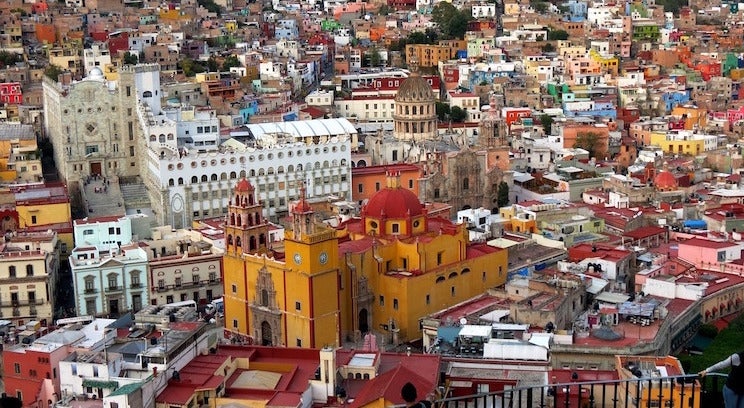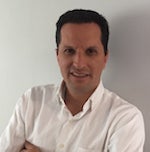
In September 2005, the US-based law firm Sullivan & Cromwell had just hired Pablo Jimenez-Zorrilla. He remembers the Sunday before his first day of work. As he was strolling through Battery Park with his wife, enjoying New York City’s scenery, his phone rang; it was one of the law firm’s partners.
“He told me: ‘You know Pablo, it’s great that you’re going to be onboarding tomorrow, but I could really use your brain here. How about preparing some information for a prospective client who is looking into a potential transaction in Mexico, and participating in a call at nine o’clock in the morning.’ It was a busy time, but I wouldn’t change anything about the amazing opportunity,” Jimenez-Zorrilla reflects.

Pablo Jimenez-Zorrilla
Stories like this showcase Jimenez-Zorrilla’s infectious positivity, ambition, and willingness to take life by the reins. Now the vice president for legal and corporate affairs of Anheuser-Busch InBev (AB InBev) Middle Americas — also known as Grupo Modelo in Mexico — Jimenez-Zorrilla fondly looks back on his professional career, and believes that every decision served as a crucial step that would ultimately lead him toward his dream of overseeing a global legal department. As he describes it, benefiting from the knowledge and expertise of his peers along the way was like “drinking from a fountain.”
AB InBev is a beverage super-company that creates beer products like Corona, Modelo, and Pacifico that are sold around the world. In Mexico alone, its regional subsidiary Grupo Modelo has seven large-scale breweries, two craft breweries, 10 vertical operations, and more than 30,000 employees — which makes them a leader of the global beer market. “Beer is the original social network. At AB InBev, we don’t like to restrict ourselves to mission statements. Our dream is to bring people together for a better world,” he says.
Growing up in San Luis Potosí, Mexico, Jimenez-Zorrilla was surrounded by both idealism and ambition. His mother was a nurse who regularly assisted eye surgeries. His father was a chemical engineer who worked in several industries before creating his own consultancy.
He is the eldest of four siblings: One is an economist, one is finishing law school, and one is studying to become a doctor. To say that determination is a common thread in his family would be an understatement.
Jimenez-Zorrilla was torn between two passions when he had to pick a profession. On one hand, he loved the human interaction and intuitive problem solving associated with the legal profession. However, he also found industrial engineering to be a fascinating professional prospect. While he initially intended to study both subjects independently at two different universities, Jimenez-Zorrilla ultimately decided to focus his energy on the law. “I tried to envision whether I would want to be sitting at a desk interacting with people and trying to dissect human relations, or whether I would want to be looking at a line of production and fixing manufacturing. This simple ‘picture of the future’ helped me make my decision,” he notes.
He enrolled in Escuela Libre de Derecho in 1997 — which he describes as a crash course in self-learning. At the law school, 95 percent of the teachers were working professionals, which meant that classes focused on tangible skills for success. He graduated with honors, in the top five percent of its class. In 2004, Jimenez-Zorrilla realized another of his dreams — enrolling in Stanford Law School for a master’s degree.
“If you really want to learn, you need to be the driving force and look for valuable opportunities everywhere. If you are not constantly trying to learn, you’re going to be at a disadvantage,” Jimenez-Zorrilla observes.
“If you really want to learn, you need to be the driving force and look for valuable opportunities everywhere. If you are not constantly trying to learn, you’re going to be at a disadvantage,” Jimenez-Zorrilla observes.
This mentality is evident in his professional résumé. Before completing his legal education, Jimenez-Zorrilla had already begun working in the field. He started as a paralegal for Bufete de la Garza, and became engrossed in the knowledge and experience of his mentors. His boss at the time, Jose Mario de la Garza, now serves as the chairperson for the Mexico Bar Association.
Later, he worked as an associate in the Mexico City office of Galicia y Robles S.C. (currently Galicia Abogados, S.C.), before accepting a job as a visiting lawyer for Sullivan & Cromwell LLP in New York City. When asked about the differences in corporate culture between the United States and Mexico, Jimenez-Zorrilla argues that they are quite similar. “I can only speak for my company, but I believe that [the corporate culture] is rather homogenous around the world. We all work under the ‘dream people culture’ principles, which provide for a common dream, meritocracy, informality, and pursuit of excellence,” he states.
In January 2014, he was appointed to his current position at Grupo Modelo — which, at the time, had just been purchased by Anheuser-Busch InBev. Sabine Chalmers, the company’s chief legal officer, and past chair of ACC, offered him the position.
“She said to me, ‘You will never have a dull day.’ She has been an amazing mentor and has kept her promise ever since. I look forward to continuing to learn from Sabine and from other outstanding colleagues in this wonderful company,” he exclaims.
“She said to me, ‘You will never have a dull day.’ She has been an amazing mentor and has kept her promise ever since. I look forward to continuing to learn from Sabine and from other outstanding colleagues in this wonderful company,” he exclaims.
AB InBev’s worldwide presence, coupled with Grupo Modelo’s national image, creates a unique blend of compliance and cross-border issues.The company regularly engages with nearly 800 municipalities in Mexico — complete with their own rules and regulations regarding the distribution of alcohol. With over 400,000 points of sale throughout the region, AB Inbev must stay vigilant to ensure regulatory compliance. Recently, the company has set its sights on expansion throughout Latin America, by first integrating with operations in Honduras and El Salvador.
Fortunately, the countries function under similar processes and standards, including contract management, compliance issues, corporate communications, and sustainability — making for a relatively easy transition of company policy. While seemingly straightforward, however, the rapid socioeconomic growth in Latin America can sometimes make it difficult to determine whether expansion could compromise the quality of the product.
“It can at times be difficult to keep up with innovations in order to make sure we both facilitate the business, and at the same time, ensure that our company is not taking any shortcuts from legal or regulatory standpoints. Still, it is an extremely exciting possibility,” he says.
“It can at times be difficult to keep up with innovations in order to make sure we both facilitate the business, and at the same time, ensure that our company is not taking any shortcuts from legal or regulatory standpoints. Still, it is an extremely exciting possibility,” he says.
However, faced with a new US administration, cross-border interactions in North America may become increasingly difficult moving forward. Considering this transition, Jimenez-Zorrilla emphasizes the significance of the North American Free Trade Agreement (NAFTA) in both AB Inbev’s and Grupo Modelo’s international business offerings. He underscores the importance of strengthening the region as a whole, arguing that North America has a lot to offer the global legal and business community.
“As you know, NAFTA is under revision and potential re-negotiation. Hopefully this opportunity is used to update and modernize our international trade framework and capitalize our position as a competitive region in the world,” he states.
In recent years, Mexico has become a global leader in trade, manufacturing, and innovation. Although it ranks low on the transparency and corruption scale, the country is undergoing reforms to increase its standing on the international playing field. To Jimenez-Zorrilla, Mexico’s dynamic landscape represents a fantastic opportunity for in-house lawyers who can keep up with the pace.
“In my opinion, the in-house community is getting more sophisticated and appealing. Issues are becoming more complex, and that requires a holistic understanding of the business and its environment,” he explains.
In five years, Jimenez-Zorrilla aspires to see the company expand its position in the global beer community, while maintaining its successes in Mexico. By supporting AB InBev in its mission to “bring people together for a better world,” he intends to, in turn, continue to “drink from the fountain.”
Throughout his life, Jimenez-Zorrilla has never turned down an opportunity. With every new experience, he has pulled from the guidance of his peers, constantly working to better himself both as a lawyer and as a person. It’s his hope that one day, he can impart the same tenacity, ambition, and positive attitude — which proved to be keys to his own success — on to the next generation of in-house lawyers.
Getting to Know... Pablo Jimenez-Zorrilla
What book are you currently reading and why?
The Founder’s Mentality, by Chris Zook and James Allen. it was a present from Marcel Telles, one of the shareholders and board members of AB InBev. Every year, he sends a book as a present to partners of the company. Topics of the book are discussed at a senior leadership convention held once a year. This year, Marcel sent us three books and this was one of them. It is about the importance of keeping a founder’s mentality — including an owner’s mindset, an insurgency attitude, and a front-line obsession — during the lifetime of a company.
Where are you going for your next vacation?
Hopefully, the Caribbean. My wife wanted to visit 40 countries before her 40th birthday — which was on March 6. She is still missing a couple, so this is an easy way to reach the toll.
If you could have dinner with anyone, living or dead, who would it be?
Bill and Melinda Gates. I would love to hear first-hand about their switch from a “corporate lifestyle” to a career filled with passion and 100 percent dedication to making a better world.



